The landscape of health and wellness is being reshaped by wearable fitness trackers. These electronic devices, worn on the wrist or clipped onto clothing, track a range of physiological data, including steps taken, heart rate, sleep patterns, and even calorie expenditure. While these trackers offer valuable insights into our activity levels and health metrics, concerns arise regarding their limitations, the potential for data misuse, and the pressure to over-quantify aspects of our well-being.
Motivation and Empowerment: Taking Control of Your Health
Wearable fitness trackers offer several potential benefits. They can be a powerful tool for motivation and accountability. Monitoring daily steps, setting activity goals, and tracking progress can incentivize individuals to become more physically active. Additionally, these devices can provide valuable insights into sleep patterns, allowing users to identify potential sleep disturbances and make adjustments to their routines to improve sleep quality. For individuals managing chronic health conditions, wearable trackers can offer valuable data points for monitoring health trends and communicating with healthcare providers.
Beyond Steps: A Holistic Approach to Wellness
Modern fitness trackers collect a wide range of data beyond simple steps. Activity trackers can monitor heart rate variability, a marker of overall stress levels, helping users identify and address stress triggers. Some trackers offer sleep quality analysis, breaking down sleep stages and providing insights into sleep efficiency. These additional features can encourage users to adopt a more holistic approach to well-being, focusing on activity, sleep, and stress management.
Data Privacy Concerns and the Potential for Misuse
The growing reliance on fitness trackers raises critical questions regarding data privacy. These devices collect a significant amount of personal information, including location data, heart rate metrics, and sleep patterns. It’s crucial that users understand how their data is collected, stored, and used by device manufacturers and app developers. Data breaches and unauthorized access to health information can have significant consequences. Strong data privacy regulations and user transparency are essential to ensure that wearable technology is used responsibly and ethically.
The Pressure to Perform: Obsession with Numbers and Gamification
While fitness trackers can be motivational tools, the focus on quantifiable metrics can become overwhelming. Obsession with step counts, calorie expenditure, and achieving daily activity goals can detract from the joy of movement and a holistic approach to fitness. The gamification aspect of some fitness trackers, with badges and virtual rewards, can lead to unhealthy comparisons and a sense of inadequacy. It’s important to maintain a healthy balance, using the data provided by trackers as insights rather than solely relying on them as a measure of progress.
Beyond the Wrist: The Future of Wearable Health Technology
Wearable technology is undergoing rapid advancements. Future iterations of wearable fitness trackers may integrate non-invasive blood glucose monitoring, offering valuable insights for diabetic individuals. Wearable sleep apnea monitors can offer early detection and management of sleep disorders. Additionally, the integration of smart clothing with embedded sensors has the potential to provide even more comprehensive physiological data, allowing for personalized health management strategies.
Technology as a Tool: Promoting Wellness, Not Obsession
Wearable fitness trackers represent a valuable tool for promoting physical activity and providing insights into various aspects of our health. However, it’s crucial to remember that they are just one piece of the wellness puzzle. Diet, stress management, and overall lifestyle choices all play a significant role in achieving and maintaining good health. Utilizing fitness trackers in a balanced manner, focusing on the insights they provide rather than being solely driven by quantifiable metrics, can empower individuals to adopt a more personalized and sustainable approach to their well-being.
